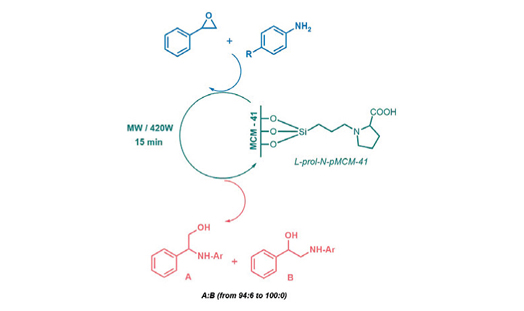N-functionalized L-proline anchored MCM-41: A novel organic–inorganic hybrid material for solvent-free aminolysis of styrene oxide under microwave irradiation
DOI:
https://doi.org/10.17344/acsi.2014.755Keywords:
Organic-inorganic hybrid material, Heterogeneous catalysis, Regioselectivity, β-Amino alcoholsAbstract
A novel organic–inorganic hybrid material, namely L-prol-N-pMCM-41, was synthesized via two steps by covalently anchoring N-functionalized proline derivative (L-prol-N-pTMS) into the pore channels of MCM-41 silica. The prepared material was characterized by X-ray diffraction (XRD), thermogravimetric analysis (TGA), nitrogen adsorption–desorption isotherm, Brunauer–Emmett–Teller (BET) surface area analysis, and Fourier Transform Infrared spectroscopy (FTIR). The immobilized catalyst demonstrated moderate to high catalytic activity and excellent regioselectivity for the ring opening of styrene oxide with aniline derivatives under microwave irradiation and solvent-free conditions. The catalyst could be rapidly separated from the reaction mixture and reused up to five runs with good conversion and high regioselectivity.

Downloads
Additional Files
Published
Issue
Section
License
Except where otherwise noted, articles in this journal are published under the Creative Commons Attribution 4.0 International License
